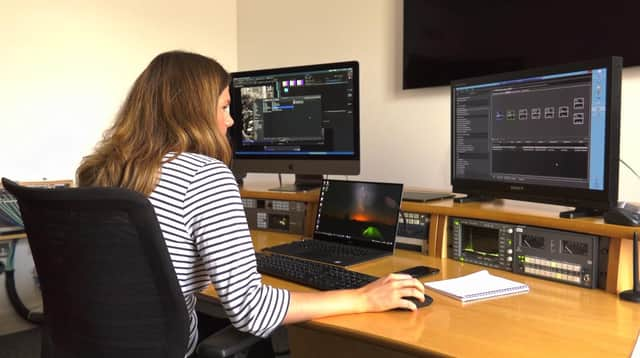How MG Alba boosts the islands’ economy


These are the headline findings from a report carried out by respected consultants, EKOS, and supported by Highlands and Islands Enterprise. Salaries account for £10.4 million of the money spent, with 160 of the jobs in Skye and the Western Isles.
Looking forward, the report projects that if BBC Alba’s programme-making budget doubled to around £26 million a year, it would support 770 jobs with an increase of 280 in Skye and the Western Isles alone, with £7.1 million coming directly into the local economy.
Advertisement
Hide AdAdvertisement
Hide AdThe report – which backs up previous studies about the economic benefits which are produced by the Gaelic creative sector – is being published at a time when issues around broadcasting and how it is funded are under close scrutiny.
A Broadcasting White Paper is expected later this year leading to a Broadcasting Bill at Westminster next year. While very small fish in the broadcasting pool, MG Alba will be hoping to push the case for a funding settlement which will give it a more secure future and allow it to expand original programme-making and its place in digital media.
Welcoming the study, MG Alba chief executive, Donald Campbell, said: “This report outlines the important role Gaelic media has in delivering economic growth, especially jobs, to our communities.
“If we are to address the issues which are facing Gaelic and the communities we serve, then we must look at investing to deliver the opportunities which can be transformational. Gaelic media is a part of the sustainable future of our communities, a key tenet in areas such as education, the creative industries, talent development and community engagement”
Advertisement
Hide AdAdvertisement
Hide AdMr Campbell added: “We will shortly publish our vision for the future of Gaelic media, which will address its potential role as a catalyst for economic growth and community engagement in Gaelic through media.”
This vision is likely to focus particularly on the need for resources to create digital connections through different platforms to the young target audience which otherwise may have little contact with the language outside of a school setting. This is not currently achievable with BBC Alba restricted mainly to its role as a linear television channel.
MG Alba’s partnership to form BBC Alba has been based on a unique funding model which was agreed in 2006. It is the only partnership of its kind the BBC has been involved in. Part of the budget came from the UK Government (later devolved to the Scottish Government) with the balance from the BBC. The total budget is currently around £20 million per annum.
This allows for limited original content and around 75 per cent of the station’s output is made up of “watch again opportunities” as repeats are now labelled. MG Alba hope to make the case not only for more funding over the coming months but also greater financial security as the BBC’s contribution - around £8 million a year - has never been formally stipulated.
Advertisement
Hide AdAdvertisement
Hide AdThe EKOS report says MG Alba “invest around one quarter of the annual production budget in ‘local’ production companies … contributing to the sustainability of a cluster of creative companies in Skye and the Western Isles”.
It continues: ”It was widely acknowledged through the consultation that in the absence of MG Alba, it would be extremely challenging to maintain a core base of creative talent in the islands – with many likely to migrate to the central belt and beyond in search of opportunities.
“Talent attraction and population retention is a key challenge for the Highlands and Islands and is a policy priority for HIE. While creating good quality employment opportunities is only one (important) part of the solution, the role that MG Alba plays in helping to sustain a key sector by collaborating with, and investing in, locally based production companies should not be underestimated”.
MG Alba is also praised for being “pro-active in the training and development of its own staff and the sector as a whole” through various channels including Modern Apprenticeships.
Advertisement
Hide AdAdvertisement
Hide AdUnder “less tangible benefits”, the report notes that the channel’s content and the stories it tells “about the Gaelic people, land, history, culture and heritage has a significant reach that transcends a perceived language barrier to reach a new non-Gaelic speaking audience”. It also notes its role as “the home of women’s football”.
There are 26 people employed at MG Alba in Stornoway and the report comments: “In addition to its commissioning activities, MG Alba has a studio fully equipped to broadcast standard that is integrated alongside the head office … The studio is available to hire for radio and TV production and for training. Good quality facilities add further depth to the islands’ offer and helps set strong foundations for the creative cluster”.
The study received support from HIE. Joanna Peteranna, interim area manager, said: “MG Alba helps to support local creative businesses through the programmes it commissions while creating and supporting many jobs in the islands. It provides opportunities to enjoy Gaelic media content, benefiting Gaelic speakers and learners across the world. We are pleased to support this study, which provides a high-level overview of how MG Alba supports economic and community development in the region and beyond.”